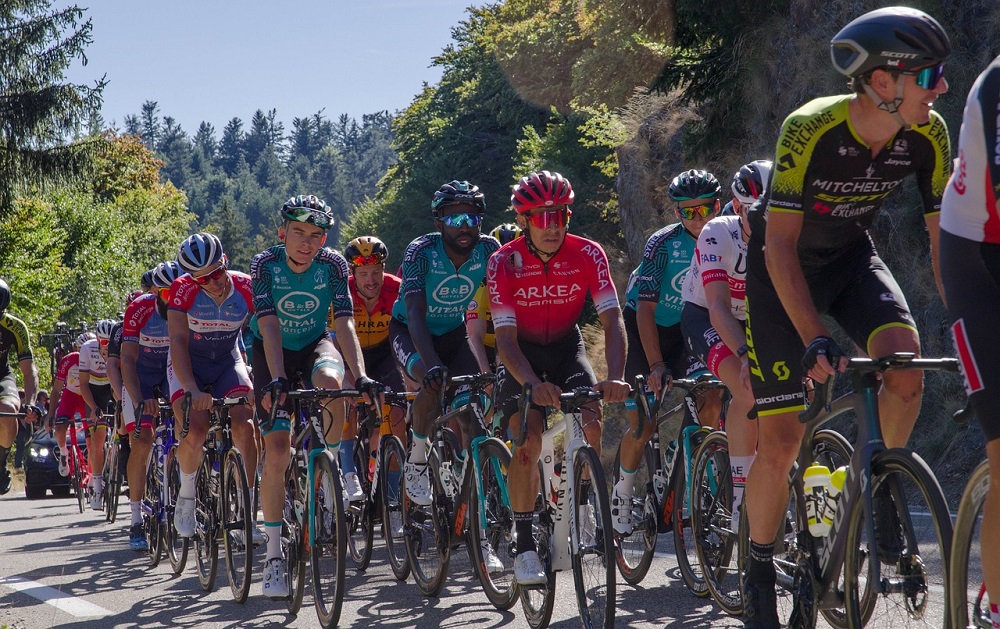Basques are using this year’s Tour de France to send a message to the world

Luke James
What football and the Red Wall has done for Wales, cycling and the ‘Orange Tide’ has done for the Basque Country.
The cycling fanatics who line the routes of hilly climbs, clad in the colours of the Euskaltel–Euskadi team and waving the red, white and green ‘Ikurrina’ flag, have been among the Basque Country’s best ambassadors.
‘Manx Missile’ Mark Cavendish described Basque fans as “the most incredible in the world” this weekend.
The absence of the Euskaltel–Euskadi team, which is in the process of rebuilding after being disbanded in 2013, meant there was a little less orange than usual on the roadsides as the Tour de France got underway in the Basque Country this weekend.
But there are more Ikurrina flags than ever being flown on the route of cycling’s most prestigious race this year as Basques take advantage of the opportunity to send a message to the world.
📸 😍 Eguneko irudia! 🔴⚪️🟢 💥 🏁
📸 😍 ¡La foto del día! 🔴⚪️🟢💥 🏁
💛 #GrandDépartPaysBasque2023 💛 #ongieTOURri
💛 #TDF2023📸 A.S.O. / @jeredgruber & @a_gruber pic.twitter.com/4RITD8jkSf
— Grand Départ Pays Basque 2023 (@letour_euskadi) July 2, 2023
Precisely 60,000 Basque flags emblazoned with the slogan ‘Basques decide’ are being distributed to spectators by Gure Esku, the campaign group for self-determination.
“We want to decide our own future freely,” said a statement from the group explaining the initiative.
“And that is, in fact, what our flag represents: the right of the citizens, which should not be subject to anyone, but in the hands of the citizens.
“We call on the Basque citizens to take these symbols to the roadsides, to make it clear to everyone that deciding our future must be in our hands.”
Giant flags were also placed alongside landmarks which were likely to be included in the sweeping helicopter and drone shots of the race broadcast around the world.
Gaurko @LeTour|eko lehenengo etapak irudi zoragarri hauek utzi dizkigu Bizkaiko herrietan.
Gugan dago etorkizunaren lema hartzea. Gure esku dago!#EuskalHerriakErabaki#BasquesDecide#TDF2023 pic.twitter.com/n1tAD33BTS
— Gure Esku (@gure_esku) July 1, 2023
The effect created along the route of the tour has been a “showcase for a nation”, according to Basque daily newspaper, Berria.
Even the President of the Tour de France, Christian Prudhomme, was pictured holding one of the flags alongside representatives of the Basque government at the ‘Grand Départ’ of the race in Bilbao on Saturday.
After two days spent in the hills between Bilbao, Donostia and capital Vitoria-Gasteiz this weekend, the race has now moved into the flatter territory of the northern Basque Country.
The Basque Country’s seven provinces straddle both the Spanish and French states, and only three of the four on the Spanish side are part of the Basque autonomous community.
Campaigners
As the race crossed into France, campaigners from Gure Esku held a protest against what they called “a border that wants to turn Basques on both sides into foreigners.”
Memories of darker times for cycling and the Basque Country have also been recalled by the race.
On Friday, around 4,000 people reportedly used the spotlight brought by the Tour de France to demonstrate in favour of the release of the last remaining prisoners serving sentences related to the ETA terrorist group.
The tour of Spain was regularly targeted by ETA during the Franco dictatorship.
The race was born as a celebration of the plurinational and democratic Spanish republic but was later used by Franco to promote his ‘One Spain’ doctrine, which saw use of the Basque language and flag banned.
In 1967, nails and oil were spread over the roads, in 1968 a roadside bomb exploded near the route and gunfire was exchanged in Bilbao during the 1977 edition. Eventually, the Basque Country was removed from the route.
The first grand départ of the Tour de France held in the Basque Country, in Donostia in 1992, was also overshadowed by the explosion of a bomb in a hotel car park.
The return of the race is meant to be another symbol of the page the country has turned since ETA disarmed in 2011 and disbanded entirely in 2018.
However, the race comes weeks ahead of a snap general election in Spain in which Madrid’s relations with the Basque Country have become a central issue.
Socialist Prime Pedro Sanchez currently leads a minority government which depends on parliamentary support from Basque pro-independence party, EH Bildu, among others.
Right-wing parties have had success across Spain for attacking Sanchez for cooperating with the party, but that has led to an increase in support for EH Bildu in the Basque Country itself.
Support our Nation today
For the price of a cup of coffee a month you can help us create an independent, not-for-profit, national news service for the people of Wales, by the people of Wales.




